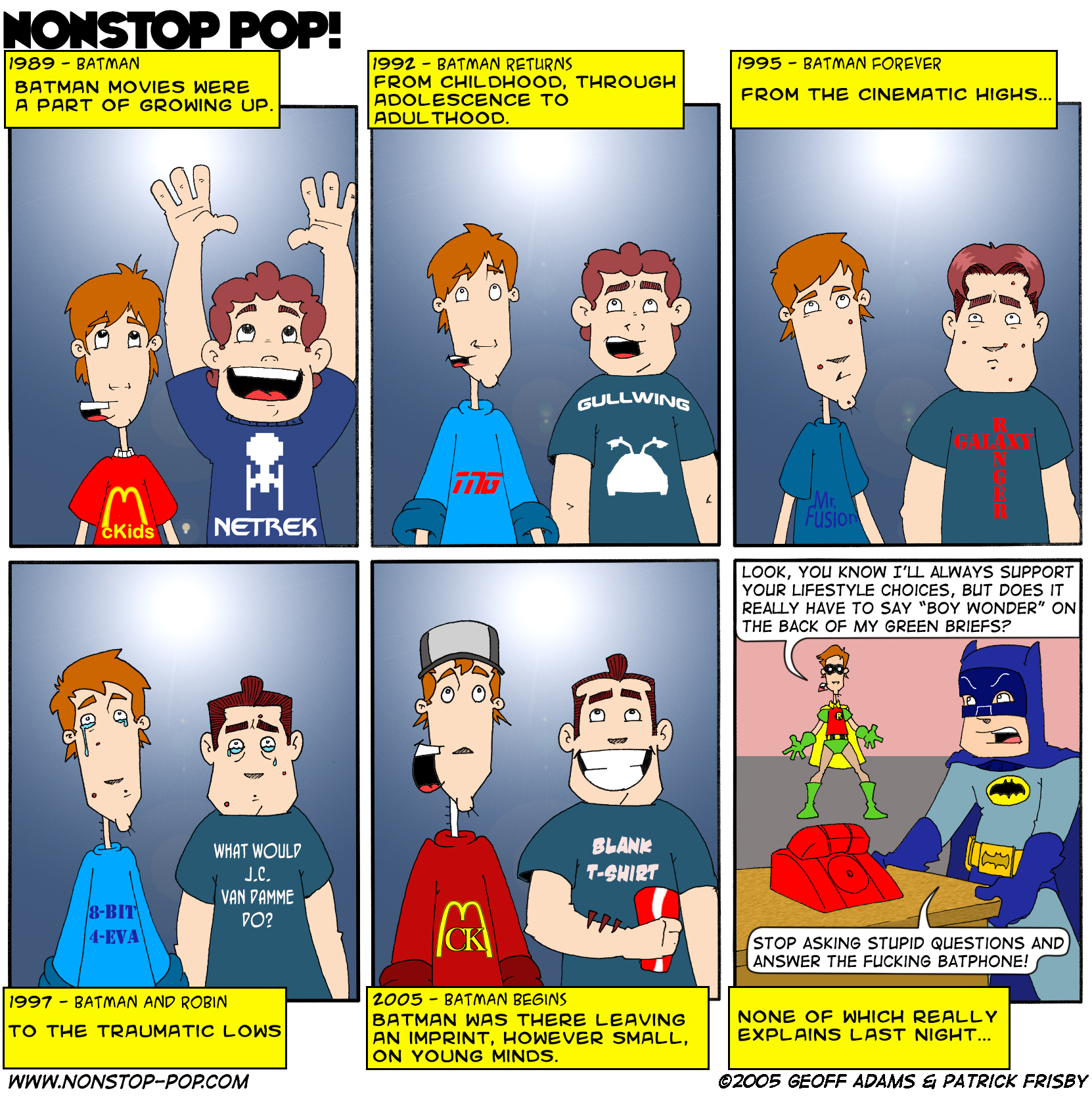Bright Lights, Dark Knights
 2005-07-28
2005-07-28
Well ok, maybe it’s not so obvious what sort of shadowy life choices are being hinted at here, but clearly I transgressed whatever the rules are by breaking character.
I remember the first time I saw any type of advertisement for the original Batman movie. My friend’s mom had just taken us to see some matinee – James Bond in The Living Daylights perhaps? – and on the way out we noticed a poster on the wall which was simply this symbol and the release date. No mention of the word “Batman” anywhere on the poster. The marketing hoods for this film thought to themselves that enough of the general public knew who Batman was and would instantly recognize the poster for what it was. Now I obviously knew of the B-man and his crimefighting exploits, but when I saw this symbol, I didn’t recognize it as the ‘Bat Symbol’, but rather it looked like a weird cartoony mouth with golden snarling teeth. I didn’t realize until about a week later that it was a poster for Batman – I thought there was some bizarre cartoon movie coming up in time for summer featuring some ghastly nightmare mouth with foul gold teeth.
I know I’m not alone in thinking that poster looked like teeth, even if I did feel like an idiot when I figured it out. Luckily I never asked anybody on the playground if they knew anything about the new scary mouth movie, or surely ridicule and rocks would have come my way.
There is no cure for verbal diarrhea.
 2005-07-28
2005-07-28
The story of comic book based films is a long and mostly tragic one… and here it is. Films based on comic books are, geologically speaking, a relatively new phenomenon. Now, I’m no film historian, so we’re just going to rely on my meandering recollections and just assume that they are all perfectly factual and true. Anyone who dares speak against the “facts” I am about to relate will be crushed like they insignificant insect they are. Fair warning.
The first of the comic book films was Richard Donner’s Superman, released in 1978. No one really needs to be told how it was received by the film viewing public, but I will anyways. It was a huge success. People loved it. The over-riding reasons for the film’s popularity? I’m glad you asked, let me tell you what I think it is. Believability, credibility, and respect. A simple formula really, it’s a shame so few of the comic book films to follow would key in to it’s great importance.
Donner’s mantra on Superman was “Verisimilitude”, that is the quality of appearing to be true or real. This lead to the film’s tag line “You will believe a man can fly”. This belief was the key to the success of the movie. Donner knew he was dealing with some thoroughly ridiculous concepts. In order to sell the audience on the notion of a man who can fly, who comes from another planet, is impervious to bullets, is super fast, etc. he had to infuse his film with a conviction that everything you’re seeing is real. And he succeeded.
Superman II lost its way a bit, Donner having been replaced. The believability was replaced with goofy spectacle… and Superman’s super pimped out love shack, complete with chrome sheets on a giant cushion/hammock bed. Youch.
Superman 3 brought us Richard Pryor, and the bad guy from the A-Team. Verisimilitude had been totally abandoned and forgotten by this point.
Superman 4… The less said about this travesty the better.
Having fallen so far so fast, Hollywood was in no real hurry to take the leap into superhero movies again. And then in 1988, Warner Bros. who happen to own DC comics decided to give it another swing, this time with a darker, edgier character than the flying boy scout. Thus it was that Batman graced the big screen in the summer of my ninth year.
Tim Burton had a vision for Batman. How effective that vision was is arguable. For the first film at least, it captured people in much the same way that Superman had. Batman was suddenly “real” and “believable”. Burton is known for being an offbeat and bizarre film maker, so it’s no surprise that Batman was a little on the weird side. Burton did manage to keep himself admirably restrained in his first outing with the Dark Knight, and that’s probably why it worked out so well.
Batman Returns saw Burton’s former restraint breakdown, to the detriment of the film. Liberties are taken with the characters. Big liberties. Penguin and Catwoman are nearly unrecognizable from their comic book roots. It’s a shame Burton felt the need to do this to the franchise, because this film opened the floodgates of camp that would drown the franchise in later years
Batman Forever. Wow, Joel Schumacher is a total ass freak. Joel seemed to be working on the notion that perhaps these movies hadn’t been enough like the old Adam West TV series. Any semblance of verisimilitude was tossed right out the window in favour of its exact opposite. Everything in the film screams ridiculous.
Batman and Robin. Considered by many to be the worst film ever made. This is not literally true. There is at least one other movie out there I can point to as being worse than Batman and Robin. That movie is called Liquid Sky. Don’t seek it out, I will not be held responsible for what this film will do to you. Back to Bats. George Clooney looked the most like Batman in costume. This is the only thing that can be said for this film though. A disaster of epic proportions.
During the years of the Batman franchise, a different bread of comic book film was emerging, sadly headlined by the staples of the Marvel universe. Yes, the Success of Batman inspired the B-Movie makers to snap up the rights to Marvel’s characters and churn out a series of near unwatchable garbage. I like to refer to this period as:
The Corman Years.
Some of you may know who Roger Corman is. He is the king of schlock B-Movies. Now, all of these films aren’t Corman, but they’re of the same ilk, which is why I group them here. Marvel used to handle their properties very poorly. Anyone with money could buy the rights to a Marvel film. The Punisher stared Dolph Lundgren and Louis Gosset Jr. It’s… bad. However, Dolph looks better as the Punisher than Thomas Jane did. Captain America = Pure ridiculousness. Rubber ears on the outside of the mask which appear to have been horribly warped by heat or something. A “plot” in only the most academic sense of the word. Special effects that would make Ed Wood blush. Liesh and I are currently writing our own screenplay for a Cap movie. Rest assured that while the previous effort was weak, ours is guaranteed* to rock your fucking socks off.
*not an actual guarantee
The Fantastic four, They get their own paragraph:
The Corman Fantastic Four was never released. This is probably for the best. That being said however, its heart is in the right place. The acting is surprisingly good for a B-grade film, and the story is at the very least, mildly entertaining. The movie has a kind of sincerity to it, you get the feeling that the people making it were fans of the Fantastic four. The production values are horrid, most of the budget apparently having been spent on the fairly impressive Thing costume, and a very lame CGI sequence featuring the Human Torch. The Costumes are laughable, Dr Doom being robed in what looks like terry cloth, giving the appearance that this ultimate super villain has just cut the arms off his favourite bath robe. The Fantastic four themselves look ridiculous in their blue spandex with felt “4” logo’s glued to the front (in some scenes you will notice the emblem beginning to peel). For all it’s flaws, it’s not bad as far as B-movies go. Nothing to get overly excited about, but if you’re a fan of the Fantastic Four, it’s worth taking a look at.
And eventually we left the 90’s with a long string of disastrous comic to film attempts behind us. Then something happened. That something was Blade.
Blade was the first of the Marvel properties to be treated with the same kind of respect that Donner showed Superman back in the day. Regardless of whether you liked the film or not, the people who made it had a clear vision about where they were going. This film was rated R. No attempts to force the subject matter into a PG film here. Blade ushered in a new era of comic book “realism” for movies. With the success of blade, Hollywood was ready to dip its toe in the waters of comic books again.
X-Men followed closely on the heals of Blade, and while the subject matter didn’t warrant an R rating, Bryan Singer steered this film towards the balmy shores of plausible impossibility rather expertly. Indeed, I’m amazed at how well X-Men came out considering the hurdles placed in its path by a Fox exec I shan’t name who was none to keen on X-Men and is currently in the process of fucking up X-Men 3.
The die was cast for the new millennium, comic movies were big, and they were going to be taken seriously by those making them. They haven’t all been triumphs of course, but what a refreshing change from the 80’s and 90’s.
There are dark clouds on the horizon though my friends. All is not well in respectable comic book film land. For as we’ve hit the very peak of the genre with Batman Begins, we are also stumbling into the mire of camp and ridiculousness with films like Fantastic Four, Elektra, League of Extraordinary Gentlemen, and the upcoming potential train wrecks of X-Men 3 and V for Vendetta. Let’s just hope that these missteps aren’t leading us back from whence we came.
On a Final note, I realize that the comic lists the term ‘cinematic highs‘ with Batman Forever. I assure you, this is merely a matter of placing text in such a manner as to make sense. The term in no way reflects either myself, or Foley’s views on the quality of Batman Forever 😉
